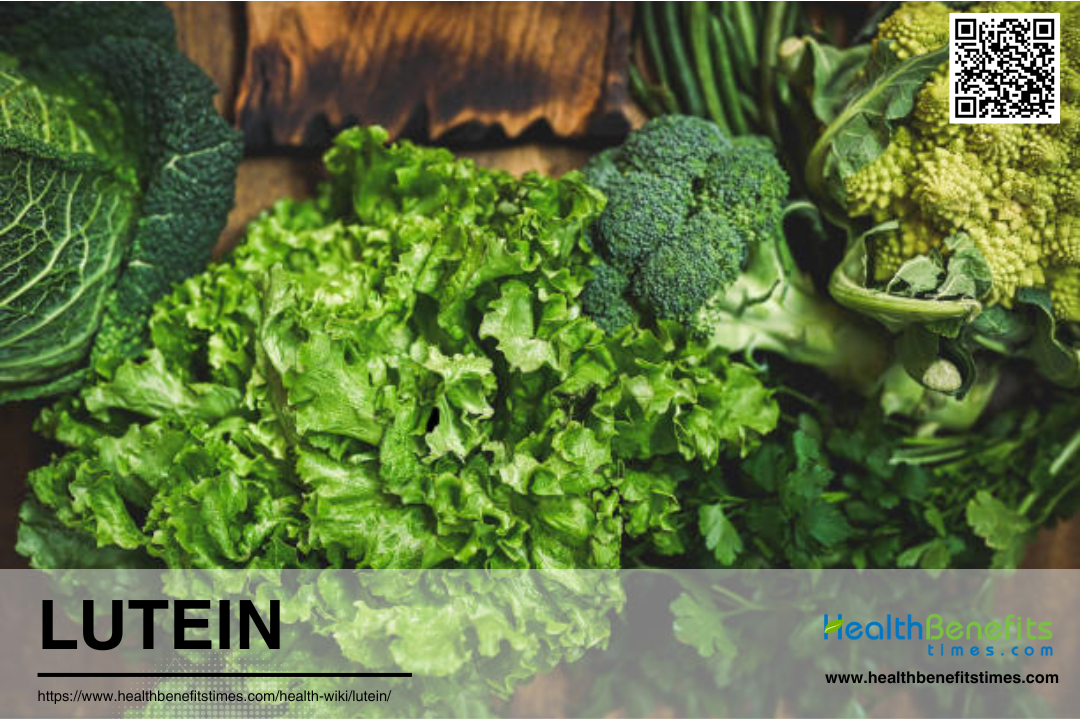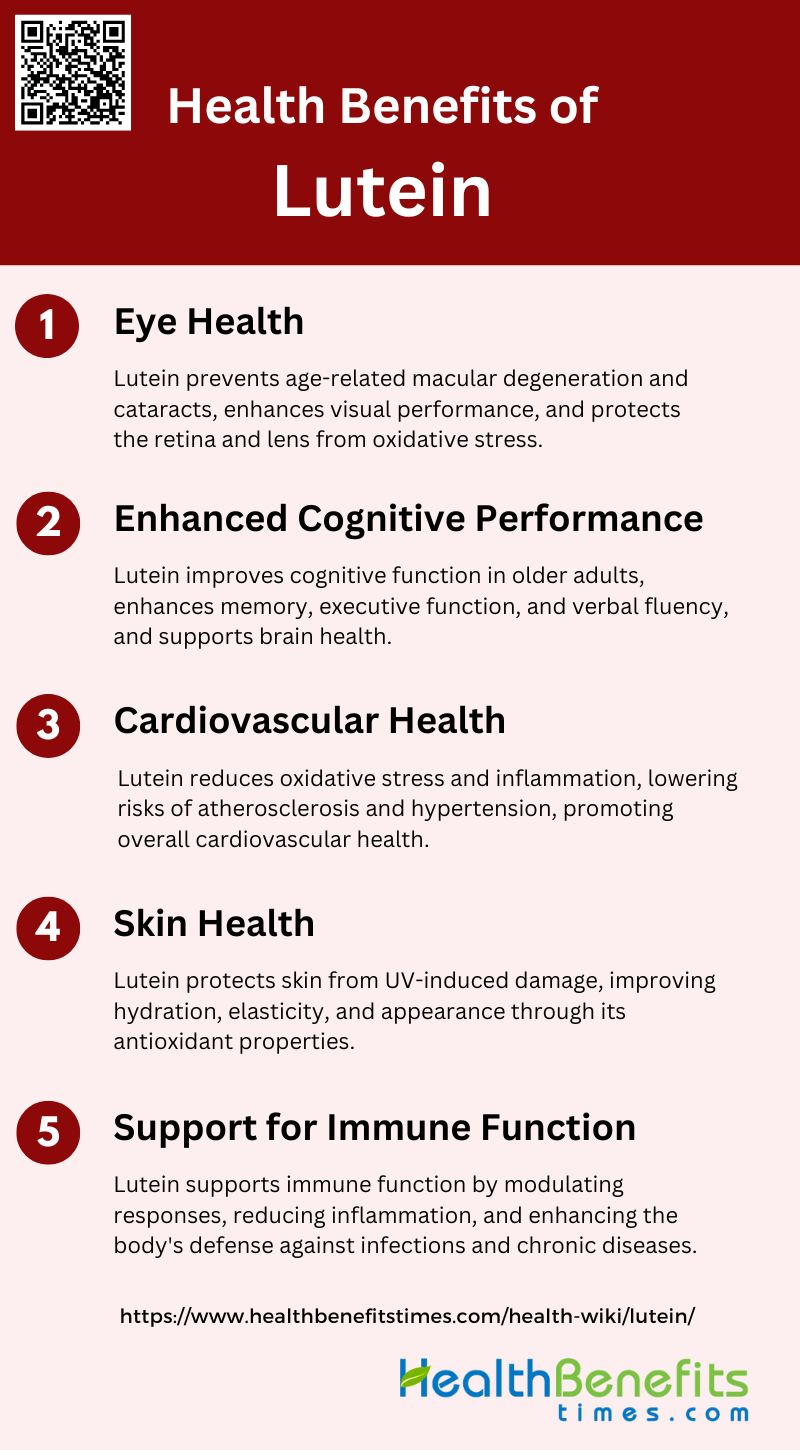Lutein is a pigmented xanthophyll carotenoid, primarily recognized for its role in eye health. It is found in high concentrations in the macula of the human eye, where it helps filter harmful blue light and acts as an antioxidant, protecting the eyes from oxidative stress and age-related damage. Lutein is also present in various fruits and vegetables, particularly leafy greens like spinach and kale, as well as in egg yolks. Beyond its benefits for vision, lutein has been linked to improved cardiovascular health and cognitive function due to its anti-inflammatory and antioxidant properties. Given its health benefits, lutein is often included in dietary supplements aimed at supporting eye health and overall well-being.
Natural sources of lutein
Lutein is a vital antioxidant that supports eye health and overall well-being. It is abundantly found in various natural food sources, making it easy to incorporate into your diet. Here are some of the best natural sources of lutein:
1. Dark Leafy Greens
Dark leafy greens are a significant natural source of lutein, a carotenoid known for its antioxidant properties and its role in maintaining eye health. Vegetables such as spinach, kale, and collard greens are particularly rich in lutein. These greens are not only beneficial for eye health but also contribute to overall well-being by reducing the risk of various diseases. Studies have shown that regular consumption of green leafy vegetables is associated with a decreased risk of all-cause mortality, coronary heart disease, and stroke. Additionally, lutein from these vegetables is less influenced by food processing, making it a reliable dietary source. The bioavailability of lutein from dark leafy greens is also notable, as it follows the same absorption path as dietary fats, ensuring efficient uptake by the body.
2. Fruits
Fruits are another natural source of lutein, although they generally contain lower amounts compared to dark leafy greens. Fruits such as oranges, kiwis, and grapes contribute to dietary lutein intake and offer a variety of health benefits. Lutein in fruits is often accompanied by other beneficial nutrients, enhancing its overall health-promoting effects. The presence of lutein in colorful fruits has gained public health interest due to its potential role in visual performance and reducing the risk of age-related macular degeneration. Moreover, the bioavailability of lutein from fruits can be influenced by the food matrix and processing methods, which can affect its stability and absorption. Despite these factors, incorporating a variety of lutein-rich fruits into the diet can help meet the recommended intake levels and support eye health and overall well-being.
Health Benefits of Lutein
Incorporating lutein-rich foods into your diet can help protect against various diseases and improve overall well-being. Here are some key health benefits of lutein:
1. Eye Health
Lutein is a carotenoid with significant benefits for eye health, particularly in preventing age-related macular degeneration (AMD) and cataracts. It functions as a filter for high-energy blue light and an antioxidant that neutralizes reactive oxygen species (ROS). Lutein and its isomer, zeaxanthin, are concentrated in the retina and lens, where they play a crucial role in maintaining visual performance and protecting against oxidative stress. Human intervention studies have shown that lutein supplementation increases macular pigment density and improves vision in patients with AMD and other ocular diseases. Therefore, sustained lutein consumption through diet or supplements can significantly contribute to eye health.
2. Enhanced Cognitive Performance
Lutein has been shown to have a positive impact on cognitive function, particularly in older adults. Studies indicate that lutein accumulates in the brain and is associated with improved cognitive performance, including memory, executive function, and verbal fluency. MRI studies have demonstrated that lutein supplementation enhances brain activities during learning and resting-state connectivity, as well as increases gray matter volumes. Although the overall effect of lutein on cognitive performance is modest, it may help in maintaining cognitive health and preventing decline, especially in executive functions. These findings suggest that lutein could be beneficial for brain health and cognitive performance in aging populations.
3. Cardiovascular Health
Its antioxidant and anti-inflammatory properties help in mitigating oxidative stress and inflammation, which are key factors in cardiovascular diseases. Some epidemiological studies have shown an inverse relationship between lutein levels and cardiovascular risk, although the evidence is not entirely consistent. Lutein is incorporated into both HDL and LDL cholesterol, which may help in reducing the risk of cardiovascular diseases. Further research is needed to fully understand the mechanisms and efficacy of lutein in promoting cardiovascular health.
4. Skin Health
Lutein has been found to protect the skin from UV-induced damage due to its antioxidant properties. It helps in neutralizing free radicals generated by UV radiation, thereby reducing oxidative stress and inflammation in the skin. Some studies suggest that lutein supplementation can improve skin hydration, elasticity, and overall appearance. The protective effects of lutein on the skin are attributed to its ability to filter high-energy blue light and its role as an antioxidant. Therefore, incorporating lutein into the diet or using lutein-based supplements may offer benefits for skin health.
5. Support for Immune Function
It helps in modulating immune responses and reducing inflammation, which is crucial for maintaining a healthy immune system. Some studies have shown that lutein can enhance the body’s defense mechanisms against infections and chronic diseases by reducing oxidative stress and inflammation. Although more research is needed to fully understand the extent of lutein’s impact on immune function, current evidence suggests that it plays a beneficial role in supporting overall immune health.
Recommended Daily Intake of Lutein
Suggested Dietary Intake for Different Age Groups
The recommended daily intake of lutein varies across different age groups. For adults, an intake of approximately 10 mg per day is suggested to support eye health and potentially reduce the risk of age-related macular degeneration (AMD) and cataracts. For older adults, particularly those at risk of cognitive decline, a similar intake of 10 mg per day has been shown to have beneficial effects on brain health. Pregnant and lactating women may also benefit from higher lutein intake, although specific guidelines are still under research. For children and adolescents, while specific recommendations are not well-established, incorporating lutein-rich foods into their diet is encouraged to support overall health and development.
Foods Rich in Lutein and Dietary Sources
Lutein is predominantly found in green leafy vegetables such as kale, spinach, and broccoli, as well as in other vegetables like peas, corn, and egg yolks. Fruits such as persimmons and certain types of squash also contribute to dietary lutein intake. For example, a study highlighted that zucchini, broccoli, lettuce, and spinach are significant sources of lutein among young adults. Additionally, egg yolks are noted for their high bioavailability of lutein, making them an excellent dietary source. Consuming a variety of these foods can help meet the recommended daily intake of lutein and support eye and overall health.
Supplements: When and Why to Consider Them
Lutein supplements can be particularly beneficial for individuals who are unable to meet their daily intake through diet alone, such as older adults or those with specific health conditions like AMD or cataracts. Studies have shown that lutein supplementation can improve visual function in patients with age-related cataracts and may also support cognitive health in older adults. Supplements are also recommended for individuals with dietary restrictions or limited access to lutein-rich foods. However, it is important to consult with a healthcare provider before starting any supplementation to ensure it is appropriate for individual health needs and conditions.
How to Incorporate Lutein into Your Diet
Incorporating lutein into your diet is essential for maintaining good eye health and overall well-being. Lutein is a powerful antioxidant found in various fruits and vegetables. Here are some tips to help you increase your lutein intake through diet:
1. Tips for Increasing Lutein Intake through Diet
Incorporating lutein into your diet can be achieved by consuming a variety of lutein-rich foods. Green leafy vegetables (GLVs) such as spinach, kale, and collard greens are excellent sources of lutein and should be included in daily meals. Additionally, other vegetables like broccoli and peas, as well as fruits such as oranges and papayas, are beneficial. Eggs, particularly the yolks, are also a significant source of lutein and can be easily added to your diet. To maximize lutein absorption, consider pairing these foods with healthy fats like olive oil or avocados, as lutein is fat-soluble. Regularly consuming a variety of these foods can help ensure adequate lutein intake.
2. Importance of Balanced Diet and Variety
A balanced diet rich in a variety of nutrients is crucial for overall health and well-being. Consuming a diverse range of foods ensures that you receive essential vitamins, minerals, and bioactive compounds like lutein, which contribute to the prevention of chronic diseases and the maintenance of good health. For instance, lutein has been shown to support eye health and reduce the risk of age-related macular degeneration, as well as potentially lower the risk of cardiovascular diseases and certain cancers. Including a mix of fruits, vegetables, whole grains, lean proteins, and healthy fats in your diet not only provides lutein but also other important nutrients that work synergistically to promote optimal health. Variety in your diet helps to cover the spectrum of nutritional needs and supports long-term health benefits.
Potential Side Effects and Interactions of Lutein
Common Side Effects
Lutein is generally regarded as safe (GRAS) and poses minimal side effects upon long-term consumption. Most studies have not reported significant adverse effects associated with lutein supplementation. However, some individuals may experience mild gastrointestinal symptoms such as nausea or stomach cramps. Additionally, excessive intake of lutein could potentially lead to carotenodermia, a harmless condition where the skin turns yellow-orange due to high levels of carotenoids in the blood. Overall, lutein is well-tolerated by most individuals, making it a safe option for dietary supplementation.
Interactions with Medications
Lutein may interact with certain medications, particularly those that affect lipid metabolism and blood pressure. For instance, lutein has been shown to have anti-inflammatory and lipid-lowering properties, which could potentially enhance the effects of statins and other cholesterol-lowering drugs. Additionally, lutein’s impact on blood pressure and endothelial function suggests that it might interact with antihypertensive medications, potentially leading to additive effects. Therefore, individuals taking these types of medications should consult their healthcare provider before starting lutein supplements to avoid any adverse interactions.
Who Should Avoid Lutein Supplements
While lutein is safe for most people, certain individuals should exercise caution. Pregnant and breastfeeding women should consult their healthcare provider before taking lutein supplements due to the lack of extensive research on its safety in these populations. Additionally, individuals with hypersensitivity to carotenoids or those who have experienced adverse reactions to lutein in the past should avoid its supplementation. People with specific medical conditions, such as those on anticoagulant therapy, should also seek medical advice before using lutein supplements, as it may interact with their medications.



